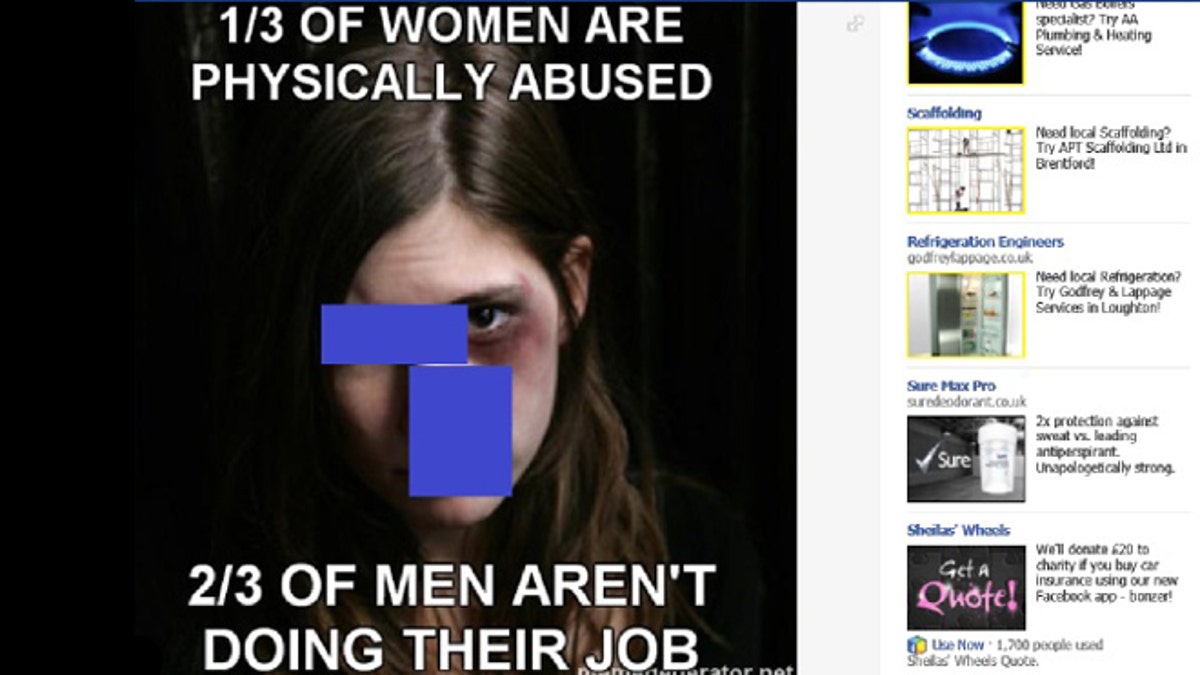
One of many examples collected by Women, Action and the Media of graphic rape jokes currently allowed on Facebook. (Women, Action and the Media)
Facebook has agreed to review its policy concerning rape jokes, after several activism groups organized a Twitter protest calling attention to the fact that pages making light of rape, assault and battery are allowed to exist on the social network.
Facebook's policy forbids posting content that is "hate speech, threatening, or pornographic; incites violence; or contains nudity or graphic or gratuitous violence."
However, the site has allowed pages about attacking, raping and abusing women; many of these pages include graphic and offensive images.
A few weeks ago, several advocacy groups decided to do something about it. And Tuesday, May 28, Facebook responded.
[pullquote]
Mobilizing primarily via Twitter under the hashtag #FBRape, organizations like The Everyday Sexism Project and Women, Action and the Media, as well as thousands of individuals, launched a grassroots protest that aimed to put pressure not only on Facebook, but on the companies that advertise with the social network as well. [See also: Yes, You've Chased Your Kids off Facebook—Here's Where They Went]
"We are calling on Facebook users to contact advertisers whose ads on Facebook appear next to content that targets women for violence, to ask these companies to withdraw from advertising on Facebook until you take the above actions to ban gender-based hate speech on your site," announced Women, Action and the Media in an open letter to Facebook.
The letter identifies a number of Facebook pages that the organization argues should be taken down under Facebook's own policy, as well as several screenshots of the offensive content.
The protestors identified several specific examples that they found to be in violation of Facebook's policy on hate speech, including pages titled "Violently Raping Your Friend Just For Laughs" and images of battered women captioned "[She] didn't know when to shut up." The full list can be found at this link (trigger warning for rape, battery and sexual assault).
Over the course of two weeks, protestors sent over 50,000 tweets with the #FBRape hashtag, as well as hundreds of emails.
Many of these focused on calling out major companies who advertise on Facebook, such asDove, Zipcar and Sky TV, sending screencaps of the companies' ads appearing next to graphic images of battered women and crude rape jokes.
Some of the companies, such as Audible.com and Procter & Gamble, pointed out that they have little control over which pages their ads appear on.
[See also: New Surveillance Laws Could Cripple Facebook, Google, US Innovation]
Protestors countered that as long as the companies were advertising on Facebook, they could not guarantee that their ads would not appear next to these offensive images. Eventually, thirteen companies agreed to pull their Facebook advertising, including Jump! Magazine and Nissan UK.
Finally, on the same day that major news outlets Buzzfeed and BBC News covered the protest, Facebook responded.
"In recent days, it has become clear that our systems to identify and remove hate speech have failed to work as effectively as we would like, particularly around issues of gender-based hate," Facebook's Marne Levine, VP of Global Public Policy for Facebook wrote on the website on May 28, 2013.
According to the statement, Facebook will review and update their guidelines and training for the people who evaluate reports of impermissible content. The social network also promises to work with groups such as Everyday Sexism to keep lines of conversation open.








































